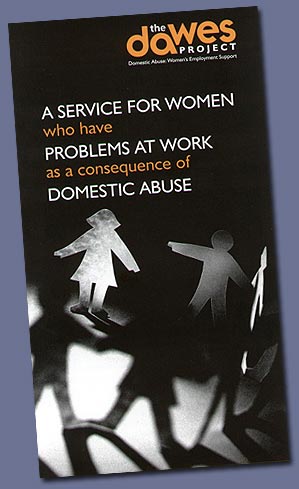 |
 |
|
Based in Manchester, the DAWES Project attended a stall at last week's Institute of Employment Rights conference in Liverpool providing a stand packed with information with regard to the issue of Domestic Abuse and it's affect for employment upon the victims of what appears to becoming a greater problem in society.
To illustrate the extent of the problem, a TUC survey has shown that 54% of trade union women had experienced, or knew colleagues who had experienced domestic violence (TUC (2002) Domestic Violence: a Guide for the Workplace) Lost economic output due to domestic abuse accounts for around £2.7 billion a year (Walby S., The Cost of Domestic Violence, Women and Equality Unit, September 2004). The DAWES Project (Domestic Abuse:Women's Employment Support) state in their leaflet (left) that domestic abuse can be defined as physical,
sexual, psychological or financial violence of
a controlling nature within an intimate or
family-type relationship. Women suffering domestic abuse may experience
some of these problems: Last year, the DAWES Project held a ground breaking conference in Manchester at Sachas Hotel, hosted by (Domestic Abuse: Women’s Employment Support), part of Greater Manchester Pay and Employment Rights Advice Service. In the first event of its kind, delegates came together to discuss the issue of domestic abuse, its impact on people’s working lives and on employment practice. A cross section of representatives attended including employers, HR departments, Trade Unions, women’s support agencies, domestic abuse services, the police, and the probation service. The conference heard speakers from the Women’s Aid Federation of England, the Home Office, Kenworthy’s Chambers and the Co-operative Group – one of only a handful of private sector employers who have adopted a workplace policy on domestic abuse. Delegates heard about the social impacts of domestic abuse; the government’s latest thinking on employers’ support to victims; potential legal remedies open to employees who may have been unfairly treated as a result of abuse; and a clear business case for adopting a workplace policy.
Conference speakers pictured right: L- R Emma Raymode – DAWES, Jo Barclay – Co-operative Group, Anisa Niaz – Kenworthy’s Chambers, Allison Foreman – DAWES, Deborah McIlveen – Women’s Aid, Samantha Darby – Home Office Emma Raymode, project worker from DAWES attending the IER conference last week, told Unionsafety: Anyone needing support or information in relation to domestic abuse and the workplace, should contact Emma at the DAWES Project on 0161 839 3236. Trade Union branches can also obtain a copy of their good practice resource (either electronic or hard copy). Boss On Your Back For Too Much Time Off? Source: DAWES Project / Unionsafety
|
 Whilst domestic abuse has always been a major issue, under reported and misunderstood by the mainstream of society and its politicians, the DAWES project was bourne out of such concerns and is a major project within the North West aiming at giving those suffering from domestic abuse, support in order to maintain employment.
Whilst domestic abuse has always been a major issue, under reported and misunderstood by the mainstream of society and its politicians, the DAWES project was bourne out of such concerns and is a major project within the North West aiming at giving those suffering from domestic abuse, support in order to maintain employment.  Allison Foreman, who initiated the conference said, “We are delighted that people are beginning to recognise domestic abuse is indeed a workplace issue and intend to press the government to take more action. The DAWES project will continue to support women experiencing problems at work because of domestic abuse, and help employers to adopt workplace policies”
Allison Foreman, who initiated the conference said, “We are delighted that people are beginning to recognise domestic abuse is indeed a workplace issue and intend to press the government to take more action. The DAWES project will continue to support women experiencing problems at work because of domestic abuse, and help employers to adopt workplace policies”